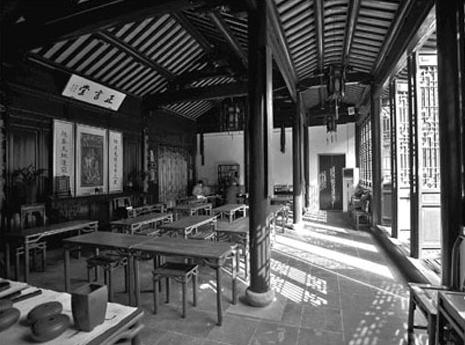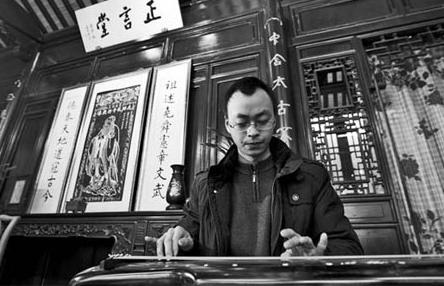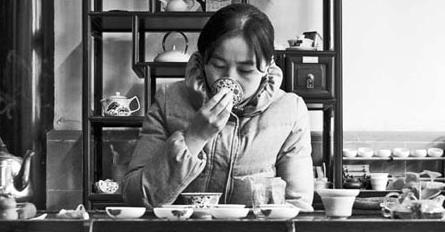
The women's college is located in a century-old traditional house in Suzhou, Jiangsu province.

Wang Xuan teaches guqin at the women's college.

Suzhou native Liu Su studies tea ceremony performances.
A traditional private women's college keeps alive ancient ways of learning.
The sign on the gate says "no visitors". Those who ignore it can be admitted to a private women's college. Age and academic background don't matter. "But they must be of decent moral character," the school's founder Fu Qi says. There are no class divisions, semesters, certificates or examinations, as Fu believes tests ruin learning. And, of course, students can quit whenever they like. Students of this school in Jiangsu's Suzhou city, which offers lessons from dawn to dusk seven days a week, can take up whatever field of study they want related to Chinese classics. They can learn calligraphy, guqin (seven-stringed zither), traditional painting - "everything and anything required of a fine Chinese lady", Fu says.
"Everything taught here can be learned elsewhere," says the 33-year-old Henan native who opened the school in 2005.
"What matters here isn't skill but rather knowing how to learn."
The university dropout says this can't be learned from Western schools.
"We advocate self-study. Learning for yourself is most important - but unfortunately an often neglected - means of learning.
The school is located in a century-old traditional house with a stone bridge spanning a fishpond that links the fishpond to the central hall, which is also the main classroom. Confucius' portrait hangs on the wall. The former bookseller and classics devotee recalls he always wanted to visit Suzhou because of its historical reputation as a hotbed of literati.
He finally made it to the city eight years ago. But when he stood in front of Hanshan Temple, which inspired some of the country's most celebrated literary works, he found passersby weren't as "genteel" and "refined" as expected.
Then he came up with the idea of opening his school in Suzhou.
"The classic style of schooling that has nurtured so many masters for centuries is dying out," Fu says.
"It's not right."
He turned his attention to the education of women, whom he believes "have a subtle but dominant power in the world".
His idea has attracted a large following, and Fu has lost track of how many students the school has received.
He started offering free lessons in a public park and later moved to the "very expensive but worthwhile" traditional house.
"Students come and go, but our classrooms get more crowded every year," Fu says.
Full-time students pay 3,000 yuan a month, while part-timers pay 70 yuan per lesson.
Students are taught by about 10 teachers, including college graduates and freelancers.
About a third of the students are hip office workers, who hop the high-speed train from Shanghai to Suzhou for classes every week.
Some men, especially businessmen, expressed interest. Fu initially refused them but eventually decided gender separation isn't important, he says.
Shanghai-based advertising company founder Qiu Jiyong is among the businessmen drawn to this "clean world", after he visited at a friend's recommendation two years ago.
"It's so different from the business world," Qiu says.
"Here, we might not know one another's occupations, family backgrounds, or names even. But in some ways, we're the most intimate of friends who share and protect a spiritual world."
Suzhou native Liu Su, who has attended the school for three years and is nicknamed "class monitor", says, "I just feel comfortable here."
The housewife and mother of a teenage boy comes twice a week to study guqin and tea ceremony performances.
But she says there isn't any particular reason she takes the classes. As she puts it: "Not everything in life needs a reason, just like the flowers don't need a reason to bloom."





